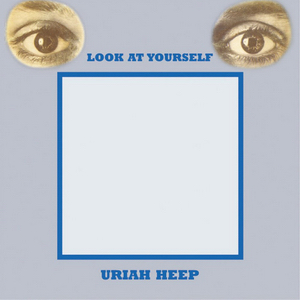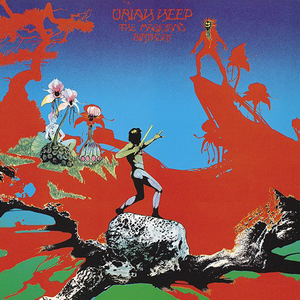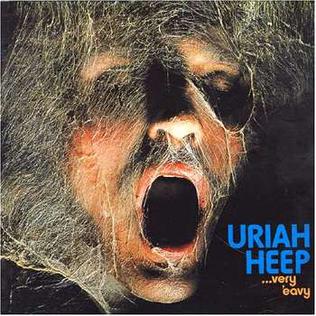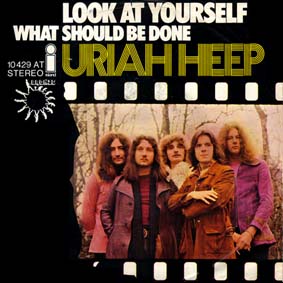
Uriah Heep are an English rock band formed in London in 1969. Their current lineup consists of guitarist Mick Box, keyboardist Phil Lanzon, lead vocalist Bernie Shaw, drummer Russell Gilbrook, and bassist Dave Rimmer. They have experienced numerous lineup changes throughout their 55-year career, leaving Box as the only remaining original member. Notable former members of the band are vocalists David Byron, John Lawton, John Sloman, and Peter Goalby; bassists Gary Thain, Trevor Bolder, John Wetton, Bob Daisley, Paul Newton, and John Jowitt; drummers Nigel Olsson, Iain Clark, Lee Kerslake, and Chris Slade; and keyboardists Ken Hensley, Gregg Dechert, and John Sinclair.

Kenneth William David Hensley was an English musician, singer, songwriter and producer, best known for his work with Uriah Heep during the 1970s.

David Garrick, better known by his stage name David Byron, was a British singer, who was best known in the early 1970s as the original lead vocalist of the rock band Uriah Heep. Byron possessed a powerful operatic voice and a flamboyant stage presence.
Spice were a British pop rock and rhythm and blues band featuring David Byron (vocals), Mick Box (guitar), Paul Newton, Alex Napier (drums) and Colin Wood (keyboards)..

Salisbury is the second studio album by British rock band Uriah Heep, released in January 1971 by Vertigo Records. It was produced by Gerry Bron.

Look at Yourself is the third studio album by English rock band Uriah Heep, released in September 1971 by Bronze Records in the UK and Mercury Records in the US. It was the last Uriah Heep album to feature founding member and bassist Paul Newton.

The Magician's Birthday is the fifth album by British rock band Uriah Heep, released in November 1972 by Bronze Records in the UK and Mercury Records in the US. The concept was "based loosely on a short story" written by keyboardist Ken Hensley in June and July 1972.

Sweet Freedom is the sixth studio album by British rock band Uriah Heep, released on 3 September 1973 by Bronze Records in the UK and Warner Bros. Records in the US.

Return to Fantasy is the eighth studio album by British rock band Uriah Heep, released on 13 June 1975 in the United Kingdom by Bronze Records. It was the first of the two albums to feature John Wetton as the new bass player, who replaced Gary Thain in early 1975.

Uriah Heep Live is a double live album by British rock group Uriah Heep, released in April 1973 in the US by Mercury Records, and in May 1973 in the UK by Bronze Records. It was the band's first live album. The album was recorded by the Pye Mobile Unit, with Alan Perkins as engineer.

"July Morning" is a song by the English rock band Uriah Heep. It is the third track on their 1971 album Look at Yourself.

...Very 'Eavy ...Very 'Umble is the debut studio album by English rock band Uriah Heep.

The Ultimate Collection is a compilation album released by the British rock group Uriah Heep. It features songs from their debut album ...Very 'Eavy ...Very 'Umble through their 1991 album Different World.

"Look at Yourself" is a song by British rock band Uriah Heep, originally released in 1971 on their third studio album, Look at Yourself, and the same month as a single, the first by the band in the United Kingdom. It was written and sung by Ken Hensley.

"Gypsy" is the debut single by British progressive rock/hard rock band Uriah Heep. It is the opening track on their first album, …Very 'Eavy …Very 'Umble, released in 1970. "Gypsy" was written by Mick Box and David Byron. The album version of "Gypsy" lasts more than six and half minutes, while the single version lasts less than three minutes. The song was also included on the band's first compilation album, The Best of Uriah Heep, and on two live albums, 1973's Uriah Heep Live and the later Live in Armenia. The song is structured with an intro, outro and three verses with no chorus, and uses only four chords: Cm, G#, G and C#-C.
"Blind Eye" is a song by the British band Uriah Heep, which was originally released on their fifth studio album The Magician's Birthday in 1972, and the B-side of the "Sweet Lorraine" single. "Blind Eye" was written by Ken Hensley. It charted at #97 in the U.S. Billboard Hot 100. It was included on Uriah Heep's live album Acoustically Driven in 2001. The song was recorded and mixed at Lansdowne Studios, London, in September 1972.

"Prima Donna" is a song by British rock band Uriah Heep from their eighth studio album Return to Fantasy (1975), released as the first single from the album. The song was written by David Byron, Mick Box, Lee Kerslake and Ken Hensley. It was recorded in May 1975 in Lansdowne and Morgan Studios, London. The song reached number ten in Denmark and number three in Norway.

"Return to Fantasy" is a song by British rock band Uriah Heep from their eighth studio album Return to Fantasy (1975). The song was written by David Byron and Ken Hensley and was the last single by the group to feature David Byron on lead vocals. The song was recorded in May 1975 in London in the Lansdowne and Morgan studios.

"One Way or Another" is a song by English rock band Uriah Heep. It was released on their ninth studio album High and Mighty in May 1976, and became the only single from the album and the last single with the band's former vocalist, David Byron. The song was written by Ken Hensley and featured lead vocals from John Wetton and Ken Hensley. It was recorded from December 1975 to March 1976 in Roundhouse Recording Studios in London. The single did not chart, and it is the only song on the album that was not sung by David Byron.
Sunrise is a song by the British rock band Uriah Heep, originally released on their fifth studio album, The Magician's Birthday, in 1972. The song was written by Ken Hensley and sung by David Byron. The song is considered one of the band's classics, and it also became famous for its live performances in late 1972 and 1973. It was included, as the opening track, on the band's first ever live album, Uriah Heep Live, in 1973. The song was recorded and mixed at Lansdowne Studios, London, in September 1972, and released on The Magician's Birthday in November of the same year. The song is also the B-side of the single "Spider Woman".


















